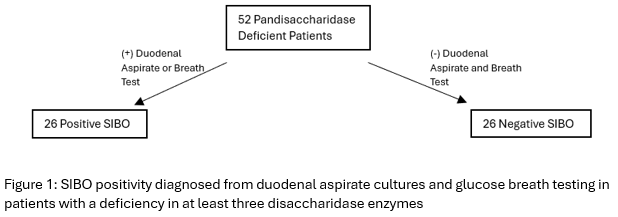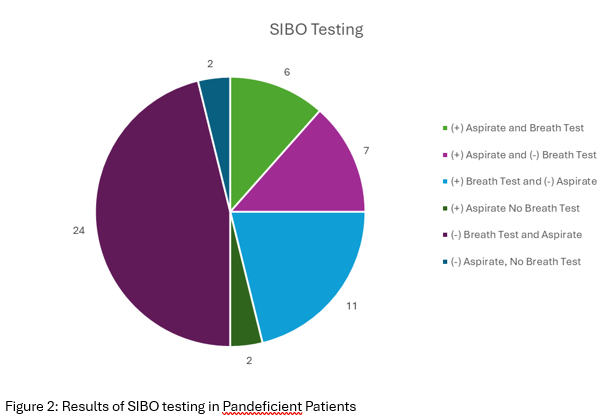Oral Paper Presentation
Annual Scientific Meeting
Session: Plenary Session 3B: Luminal GI / Endoscopy / Pancreas
51 - Is Pandisaccharidase Deficiency Associated With Small Intestinal Bacterial Overgrowth?
Tuesday, October 28, 2025
3:05 PM - 3:15 PM PDT
Location: North Ballroom 120BC

Brendan Kemple, MD (he/him/his)
Augusta University Medical Center
Augusta, GA
Presenting Author(s)
Brendan Kemple, MD1, Alexander Woodcock, MD1, Amanda Tyra, PA-C1, Daniel Rim, MD2, Satish SC. Rao, MD, PhD, FACG1
1Augusta University Medical Center, Augusta, GA; 2Augusta University Medical Center, Evans, GA
Introduction:
Background: Disaccharidases break down complex carbohydrates to facilitate their absorption in the small bowel. Although single disaccharidase enzyme deficiency such as lactase is commonly prevalent, approximately 11% of patients with unexplained GI symptoms have pandisaccharidase deficiency whose etiology is unknown.
Aim: To examine the relationship of small intestinal bacterial overgrowth (SIBO) in the pathogenesis of pandisaccharidase deficiency.
Methods: Patients with unexplained gas, bloating and pain and normal endoscopy/imaging had a 75 g, 2 hour, standard, glucose breath test (GBT), and small bowel aspirates and culture using aseptic precautions, and duodenal biopsies for lactase, sucrase, maltase, palatinase and glucoamylase activity. Those with three or more enzyme deficiency (pandeficient) were included in the analysis. The patients ' levels of pain, cramping, constipation, belching, bloating, fullness, indigestion, nausea, diarrhea vomiting and flatulence were collected using a validated survey.
Results: 52 patients (71% female, mean age 52.88) were identified as pandisaccharidase deficient in a cohort of 497 patients. Among these, lactase deficiency was seen in 90.4%, Maltase in 98.1%, Sucrase in 76.9%, Alpha glucoamylase in 50%, and Palatinase in 98.1%. Of these, 26 (50%) patients had either a positive aspirate (≤20 ppm H2 and/or ≥ 10 ppm, CH4 rise), indicative of SIBO or small intestinal methanogenic overgrowth (SIMO) (Figure 1). Duodenal aspirates were positive in 15 (28.8%) and GBT was positive in 17 (32.7%); 31 had normal GBT. There was no significant difference in symptom profiles between those with SIBO positive and SIBO negative group (p-values 0.07-0.79).
Discussion: Approximately 50% of patients with pandisaccharidase deficiency demonstrate evidence for concurrent SIBO/SIMO. These findings suggest a possible etiologic link between small intestinal dysbiosis and carbohydrate malabsorption/intolerance at least in a proportion of patients. This may also explain why symptoms persist in some patients who are treated for either carbohydrate intolerance alone (for example low FODMAPS diet) or antibiotics alone for SIBO/SIMO. Recognition of SIBO and its treatment together with dietary modification may be required to improve symptoms in such patients.

Figure: Figure 1. SIBO positivity diagnosed from duodenal aspirate cultures and glucose breath testing in patients with a deficiency in at least three disaccharidase enzymes

Figure: Figure 2. Results of SIBO testing in Pandeficient Patients
Disclosures:
Brendan Kemple indicated no relevant financial relationships.
Alexander Woodcock indicated no relevant financial relationships.
Amanda Tyra indicated no relevant financial relationships.
Daniel Rim indicated no relevant financial relationships.
Satish Rao: Laborie Medical Technologies – Grant/Research Support. Vibrant Ltd – Advisory Committee/Board Member.
Brendan Kemple, MD1, Alexander Woodcock, MD1, Amanda Tyra, PA-C1, Daniel Rim, MD2, Satish SC. Rao, MD, PhD, FACG1, 51, Is Pandisaccharidase Deficiency Associated With Small Intestinal Bacterial Overgrowth?, ACG 2025 Annual Scientific Meeting Abstracts. Phoenix, AZ: American College of Gastroenterology.
1Augusta University Medical Center, Augusta, GA; 2Augusta University Medical Center, Evans, GA
Introduction:
Background: Disaccharidases break down complex carbohydrates to facilitate their absorption in the small bowel. Although single disaccharidase enzyme deficiency such as lactase is commonly prevalent, approximately 11% of patients with unexplained GI symptoms have pandisaccharidase deficiency whose etiology is unknown.
Aim: To examine the relationship of small intestinal bacterial overgrowth (SIBO) in the pathogenesis of pandisaccharidase deficiency.
Methods: Patients with unexplained gas, bloating and pain and normal endoscopy/imaging had a 75 g, 2 hour, standard, glucose breath test (GBT), and small bowel aspirates and culture using aseptic precautions, and duodenal biopsies for lactase, sucrase, maltase, palatinase and glucoamylase activity. Those with three or more enzyme deficiency (pandeficient) were included in the analysis. The patients ' levels of pain, cramping, constipation, belching, bloating, fullness, indigestion, nausea, diarrhea vomiting and flatulence were collected using a validated survey.
Results: 52 patients (71% female, mean age 52.88) were identified as pandisaccharidase deficient in a cohort of 497 patients. Among these, lactase deficiency was seen in 90.4%, Maltase in 98.1%, Sucrase in 76.9%, Alpha glucoamylase in 50%, and Palatinase in 98.1%. Of these, 26 (50%) patients had either a positive aspirate (≤20 ppm H2 and/or ≥ 10 ppm, CH4 rise), indicative of SIBO or small intestinal methanogenic overgrowth (SIMO) (Figure 1). Duodenal aspirates were positive in 15 (28.8%) and GBT was positive in 17 (32.7%); 31 had normal GBT. There was no significant difference in symptom profiles between those with SIBO positive and SIBO negative group (p-values 0.07-0.79).
Discussion: Approximately 50% of patients with pandisaccharidase deficiency demonstrate evidence for concurrent SIBO/SIMO. These findings suggest a possible etiologic link between small intestinal dysbiosis and carbohydrate malabsorption/intolerance at least in a proportion of patients. This may also explain why symptoms persist in some patients who are treated for either carbohydrate intolerance alone (for example low FODMAPS diet) or antibiotics alone for SIBO/SIMO. Recognition of SIBO and its treatment together with dietary modification may be required to improve symptoms in such patients.

Figure: Figure 1. SIBO positivity diagnosed from duodenal aspirate cultures and glucose breath testing in patients with a deficiency in at least three disaccharidase enzymes

Figure: Figure 2. Results of SIBO testing in Pandeficient Patients
Disclosures:
Brendan Kemple indicated no relevant financial relationships.
Alexander Woodcock indicated no relevant financial relationships.
Amanda Tyra indicated no relevant financial relationships.
Daniel Rim indicated no relevant financial relationships.
Satish Rao: Laborie Medical Technologies – Grant/Research Support. Vibrant Ltd – Advisory Committee/Board Member.
Brendan Kemple, MD1, Alexander Woodcock, MD1, Amanda Tyra, PA-C1, Daniel Rim, MD2, Satish SC. Rao, MD, PhD, FACG1, 51, Is Pandisaccharidase Deficiency Associated With Small Intestinal Bacterial Overgrowth?, ACG 2025 Annual Scientific Meeting Abstracts. Phoenix, AZ: American College of Gastroenterology.

